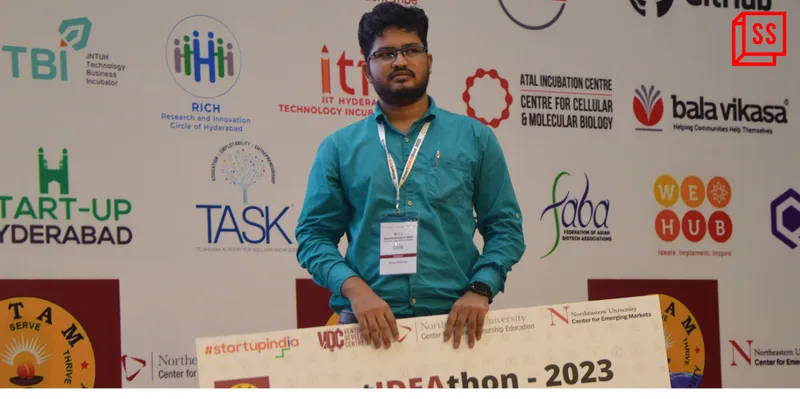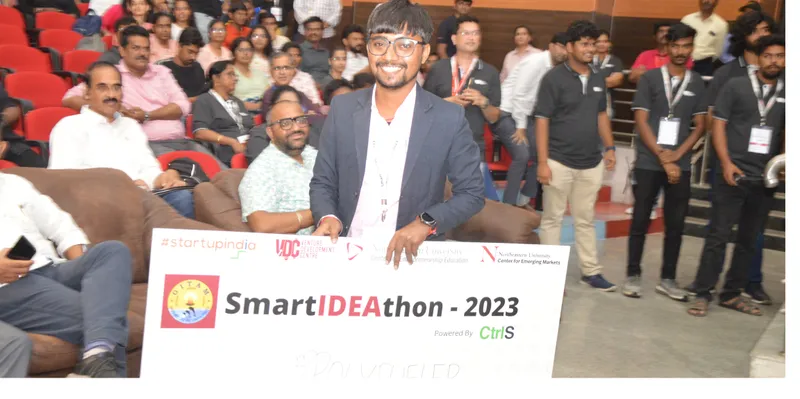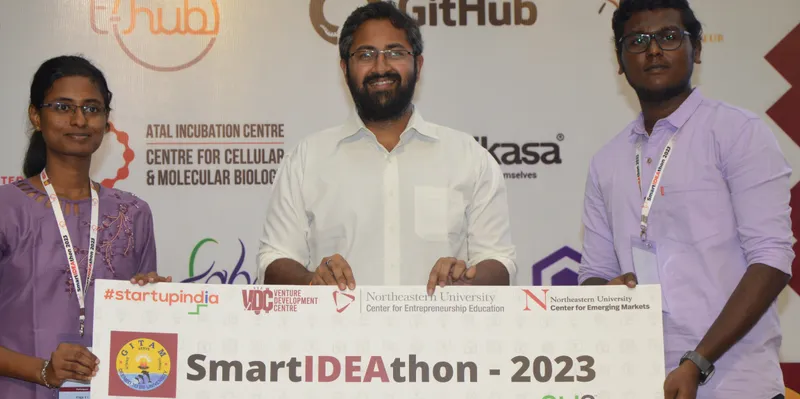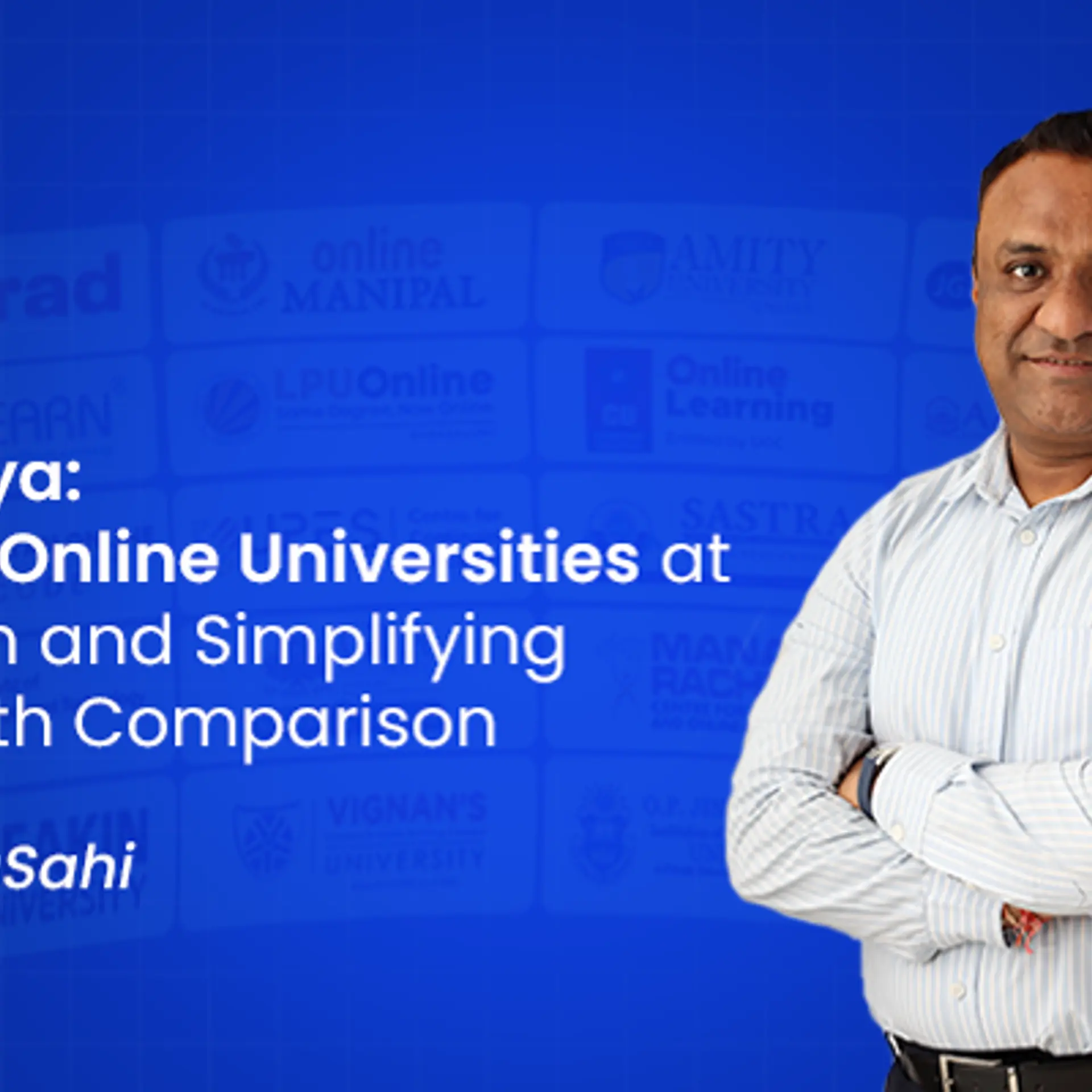From making cooking safer to transforming plastic waste into fuel–youth showcase smart innovation
At GITAM University’s SmartIDEAthon, students from all over India pitched their ideas across three themes—food and health, toys for STEM, sustainable fashion and frugal innovation. SocialStory brings you the stories of five winners and their social innovations.
Anup Paikaray, a final year student of Odisha University of Technology and Research, Bhubaneshwar has developed Chuliv, the world’s first automatic blower. Paikaray was the winner at the the SmartIDEAthon 2023—an annual pan-India mega pitch-fest organised by GITAM (Deemed to be University) last week in Hyderabad.
The event is a collaborative initiative of GITAM Venture Development Centre, Startup India, Northeastern University Center for Entrepreneurship Education, and North Eastern University Center for Emerging Markets at Northeastern University, Boston.

Anup Paikaray
Paikaray says his innovation stemmed out of concern, love, and curiosity.
“My grandmother who lived in a remote village in Odisha, despite having LPG connection in her home, was stubborn that she’d only cook on a chulha. Years of blowing into the fire affected her health, her eyes were red from the smoke and she would cough incessantly,” he tells SocialStory.
On research, he discovered that even in 2023, nearly two billion people all over the world, including Africa, the Philippines, Indonesia, Bangladesh, and India use chulha to cook. Also, every year, nearly three million women die of carbon monoxide poisoning.
Despite the central government’s Pradhan Mantri Ujjwala Yojana scheme, when he visited the villages, he saw that women were using the LPG stove for small tasks like making tea while they still used the chulha for most of the cooking.
His grandmother’s constant battle with the chulha got him thinking. He designed a product during his first year of college. It was a pedal-operated stove with a fan, to push air into the stove. But on introducing the product to villagers, they were put off by the price of Rs 1,600. The idea had failed because there was no acceptance.
“He turned back to the drawing board, spoke to people who had used his previous product and found that he had to create an automatic solution—one that does not require electricity, or any external intervention. And that’s how I thought why not use the heat that is produced by the chulha to operate a device to maintain the flame,” he says.
That’s how Newrup Solutions and its smart innovation, Chuliv, was born. An innovation that can be attached to the mouth of a chulha of any size, increasing its efficiency by 30%, Chulvi reduces the chances of inhaling toxic fumes and the time of cooking, thus benefiting rural women and costs just Rs 500.
Now past the proof-of-concept stage, Paikaray is working with CTTC Bhubaneswar on developing the prototype along with KIIT-TBI. It's incubated at NSRCEL (IIM, Bangalore).
“Our first client is ICICI Foundation, which has given us an order of 10,000 units for distribution in rural areas,” he says. He’s looking forward to government support to scale his business further.
The runner-up of the SmartIDEAthon, Polyfueler, is a revolutionary idea from Vineet Kumar and Manish Bibhu, students of Sershah Engineering College in Bihar. Polyfueler is working on revolutionising waste management by transforming diverse plastic waste into fuel, powered by a proprietary catalyst.

Vineet Kumar
Vineet Kumar, a third-year student of BTech in Electronics and Communication Engineering has been working on the project for three years.
“I read a newspaper article that said plastic pollution is one of the major pollutants in the country. I thought we should think of an idea that could utilise different types of plastic waste,” he says.
Polyfueler’s technology (patent pending), Kumar claims, can efficiently transform 1 kg of waste plastic into 800 ml of valuable fuel, addressing both plastic waste and energy needs simultaneously.
Kumar and Bhibhu received the Swachhata Saarthi fellowship and subsequently was incubated at IIT Patna.
“Currently, we have a 20 kg running unit and collaborate with the Nagar Parishad to collect plastic waste and give them the fuel. We have converted 1,000 kg of waste so far,” he adds.
Polyfueler has the licence to convert waste into diesel, and Kumar believes once iterations to the process are made, petrol too can be produced.
The duo has garnered recognition from organisations, both in India and abroad. They also conducted a demo at the PMO and have received research invites from institutes in Russia, Poland, Zimbabwe, South Africa, China, and Portugal.
Smart and innovative solutions

Yoga and Ramanan of MediCandy
On the other side of the idea spectrum, the winner of the Leben Johnson People’s Choice Award were Yoga V I and Ramanan KBI of Kumaraguru College of Technology & Bannari Amman Institute of Technology from Coimbatore, Tamil Nadu, for their startup MediCandy, which offers anti-diabetic solutions.
“Most of my family, including my grandparents and uncle, suffer from diabetes. One of my school friends has juvenile diabetes. Though they are supposed to stay away from sweets and desserts, there is always a craving,” Yoga says.
The childhood friends are using manila tamarind to make gummies and candies to address the sweet cravings of diabetics. They claim the product helps in regulating the blood sugar level.
Under the best woman-led Entrepreneurship Idea, K Ushasri Devi and P Sushma Devi from GITAM School of Business in Visakhapatnam, Andhra Pradesh, bagged a Rs 50,000 cash prize for their venture, COACT. The startup strives to empower visually challenged women aged 15-55 by letting them track their menstrual cycle, liberating them from sub-optimal methods, and ensuring their self-sufficiency in meeting their essential needs.
Their innovation, called Beye, features an undergarment with fabric sensors, an electronic module, and a panty liner with a conducting patch. The duo recently won the AP Innovation Award from Andhra Pradesh Chief Minister YS Jaganmohan Reddy.
The final winner of the SmartIDEAthon, Agrodroid, developed by Mahesh Vappu, Adhnan Mohammed, Naveen Gadala, and Jeswanth Reddy, offers customised robot-based services to cotton farmers. AgroDroid is an autonomous rover robot capable of Ploughing, sowing seeds, weeding fields, fertilising crops using precision spraying and solid fertilisation, and harvesting cotton. The company has already forged partnerships with Microsoft for Startups (Founders Hub), Vangala, AWS Activate, Eco-Orbit and E-Dam.
Sreedevi Devireddy, Director, Venture Development Centre at GITAM (deemed to be) University, believes in the realm of innovation, market validation stands as the ultimate litmus test. Every student or ideator holds their idea close, believing it’s foolproof. However, the real game-changer lies in acknowledging the power of customer insights.
“We strongly advocate for each ideator to embark on a journey of customer research. Delve deep into understanding their needs, pain points, and preferences. This process unveils invaluable insights that shape and refine the initial idea,” she says.
“Market validation challenges assumptions, sparks innovation, and leads to the evolution of ideas. This process has the potential to uncover new avenues, unmet needs, and solutions that resonate profoundly with the target audience,” she adds.
SmartIDEAthon 2023 invited participation from undergraduate and postgraduate student innovators and ideation-level ventures to pitch ideas for sustainable and resilient community building across four themes: food and health, toys for STEM, sustainable fashion and frugal innovation. It received 1007 entries. The winners received Rs 2 lakh as cash prize and a sponsored trip to Boston.
(The copy has been updated to rectify a typo.)
Edited by Megha Reddy






